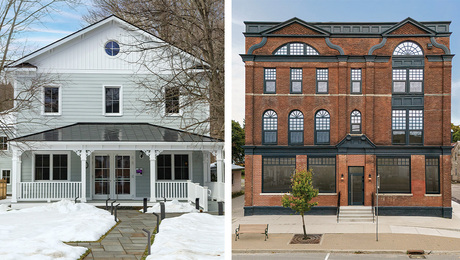*
Looking for any information or sources for redirecting the moist, hot air from a dryer vent into another space, i.e. garage. Any war stories?
Eric Buller, Richmond, VA
Discussion Forum
Discussion Forum
Up Next
Video Shorts
Featured Story

A high-performance single-family home builder shares tips from his early experience with two apartment buildings.
Featured Video
A Modern California Home Wrapped in Rockwool Insulation for Energy Efficiency and Fire ResistanceRelated Stories
Highlights
"I have learned so much thanks to the searchable articles on the FHB website. I can confidently say that I expect to be a life-long subscriber." - M.K.
Fine Homebuilding Magazine
- Home Group
- Antique Trader
- Arts & Crafts Homes
- Bank Note Reporter
- Cabin Life
- Cuisine at Home
- Fine Gardening
- Fine Woodworking
- Green Building Advisor
- Garden Gate
- Horticulture
- Keep Craft Alive
- Log Home Living
- Military Trader/Vehicles
- Numismatic News
- Numismaster
- Old Cars Weekly
- Old House Journal
- Period Homes
- Popular Woodworking
- Script
- ShopNotes
- Sports Collectors Digest
- Threads
- Timber Home Living
- Traditional Building
- Woodsmith
- World Coin News
- Writer's Digest


















Replies
*
How rusty do you want your tools? If the drier vent alone won't do the job, try wetting the tools and sprinkling some salt on them. Give it a week & viola, they'll be junk. :) Joe H
*Finally remembered why I hadn't used the forum in so long. Thanks for the helpful reply. Guess I'm just an idiot.
*You should learn to take yourself a little more seriously.
*You asked for war stories, didn't you??
*Eric,Don't worry, you're not alone. A lot of people try this. (Did it once myself, when I was young and renting )Whether it does damage depends on a lot of factors. I always reccommend agaisnt it because you don't really control the amounts (depends on the number of loads, partly)Also, if you have a gas dryer, you could put very dangerous amounts of CO in the air.
*You can't do it with a gas dryer. Way too stupid and too dangerous. But with an electric dryer, sure, go for it. In my climate, in the winter, with 22-28% indoor RH, more moisture is always good. In less extreme climates, you may not want all the humidity in the house on wash day. Also consider where air leaves your house. Most of the air leaves my house through the HRV so extra humidity is not a problem. Most houses are not as tight and air leaves through the walls, windows, and ceiling. Sending more moisture with it can cause condensation or ice formation in the attic and/or wall insulation. Not a good thing.So if you have very dry air, a fairly tight house, an electric dryer, and an urge to tinker, I'd argee that it is a reasonable project.But if one of those isn't true and certainly if two are not the case, I'd recommend against it.I don't see the benefit of adding moisture to the garage. The car brings in enough rain and snow to deal with already. Increasing the RH helps you where you live, inside the house. It helps prevent chapped lips, dry skin, and static sparks. It also reduces the fire hazard of very dry trim and furnishings. -David
*I only use my dryer in winter, but the moisture is absoloutely welcome. I figure it's time to do laundry when petting the cat becomes a shocking experience.I have a sort of bucket thing that was ready-made just for this. It's attached to the wall, the vent hose runs into it and one is supposed to keep it full of water to collect the lint, but i often use a Febreze mixture instead--makes the house smell great! House is open plan, so no problems with moisture build-up though i have a wooden exterior door just two feet from the dryer.
*Eric,It is obvious you already know about the moisture levels of the air, and that it will be hot. You said so. I must assume then that you want this moisture laden, hot air for a specific purpose, and the garage is the ideal room for your endeavor. I used this method a few years back for a miniature greenhouse. It worked very well. Home centers and hardware stores sell the type of fixture that splintergroupie speaks of. It hooks up to the exhaust vent end, and allows you to hook another hose to it and direct the airflow anywhere you want. The longer the run you need to make from the current hose to your new location, the cooler and drier the air will be by the time it makes it to its final destination. If you need or want the moist, hot air, then you will need to make the connection hose as short as possible.James DuHamel
*Thanks for all the replies. Sounds like it has some promise. Also re-established my faith in this forum. I will be back!
*I tried it couple times in years gone by - first was during energy crisis in 70's when I was burning fuel oil. Hasn't proven worthwhile for me as I wasn't "willing" to perform needed monitoring of humidity levels and ended up with more problems than good, from my perspective. Potential certainly is there to do some good but there is a basic rule of physics (I believe) that touts equal and opposite reactions - think some call it Murphy's Law. Subject still intrigues me though, especially on cold winter days when I'm outside warming my hands with all that warm air from dryer vent. Is no doubt very wasteful but someone smarter than I will have to come up with answer. My best to you.